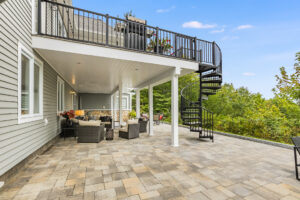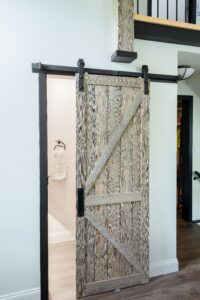Should You Build an Attached ADU or a Detached ADU?
ADUs (Accessory Dwelling Units) are rising in popularity with New England homeowners, whether used as rental properties or just additional living space. If you plan to add an ADU to your home, you must decide between an attached or detached option. Each type of ADU has pros and cons, and you’ll want to consider several factors, like budget, size, zoning regulations, and more.
In this blog, the remodeling team at Foremost Builders explores the differences between attached and detached ADUs and which may be best for you.
What Is an Attached ADU?
An attached ADU is a home addition that builds off the existing structure of your home. These units can be used to expand the square footage of your home and are great if you need more space but want it to feel integrated into your home.
The attached ADUs are a good choice if you want to add a home office or gym or need space for your growing family.
What Is a Detached ADU?
A detached ADU is a stand-alone structure built on the same property. It can be a great option if you have the space for a detached ADU on your lot. These structures are perfect if you want:
- Space for guests or family members
- Rental income
- Separate spaces for work or hobbies
Keep in mind that any detached structure must adhere strictly to local zoning laws, and the permits are often more complicated than they would be for an attached addition.
Key Considerations When Choosing Between an Attached and Detached ADU
1. Budget
By and large, attached ADUs are typically the most cost-effective structures to build. You must consider construction costs, permitting fees, utility connections, and more with detached units. However, if you plan to use your detached ADU as a rental property, the investment may be more than worth it.
2. Property Value
Both attached and detached ADUs can boost your property value. However, buyers might not see the benefit of a detached ADU if they don’t have a specific purpose for it, such as needing extra work space or wanting to rent it out. On the other hand, attached ADUs ultimately just make the home larger, which can be a draw for buyers who need the space or have a large family.
3. Local Zoning Regulations
You’ll want to consider local zoning regulations no matter which kind of ADU you build. However, there are fewer regulations to consider when adding to an existing structure. Researching regulations and discussing them with your remodeling company is important before deciding.
4. Property Size and Layout
The size and shape of your existing property and the size of the ADU you want should influence your decision. There are limits on how large you can build your structure if you’re adding it to your existing home, but if you’re building a detached ADU, you’ll need to consider lot size.
5. Privacy Needs
An attached ADU is just another room in your home. If you plan to use this space for your household and privacy is not much of a concern, an attached ADU might fit your needs. However, a detached unit might make more sense if you need privacy for renters or in-laws or want a more isolated spot for working in a home office.
6. Purpose and Potential Future Uses
The most obvious question to ask yourself is what you plan to use the ADU for. Attached and detached ADUs can be used to extend your living space, but if you plan to use them as a rental space or guest house, you’ll want to seriously consider a detached ADU.
Advantages of Attached ADUs
- Lower construction costs: Fewer permits and easier utility hookups make attached ADUs more affordable for many homeowners.
- Easier access to utilities: Any attached addition will share utility lines with your existing home, making it easy to connect water and electricity to your new space.
- Seamless integration: Attached ADUs are an excellent option for homeowners with more limited space looking to expand their living space without needing a separate building.
Advantages of Detached ADUs
- Increased privacy: A detached structure provides seclusion and privacy for guests or renters.
- Greater design flexibility: Because you’re not working with an existing structure, detached ADUs offer more room to get creative with materials, fixtures, and overall design.
- Potential for higher rental income: Whether you’re renting it out for the long or short term, the privacy and accessibility that a detached ADU provides can help you attract renters more easily.
Attached vs. Detached ADU: Which Is Right for You?
Choosing between an attached and detached ADU comes down to logistics and personal preferences. With so many factors to consider, it can be a difficult decision. The right remodeling company will offer guidance on how to make the final decision based on your circumstances.
Foremost Builders is here to help. With our decades of experience and collaborative team of designers and builders, we can help you navigate every step of the ADU planning, permitting, and construction process.
If you’re considering adding an ADU to your property in the Lake Sunapee region, contact our team today.

























